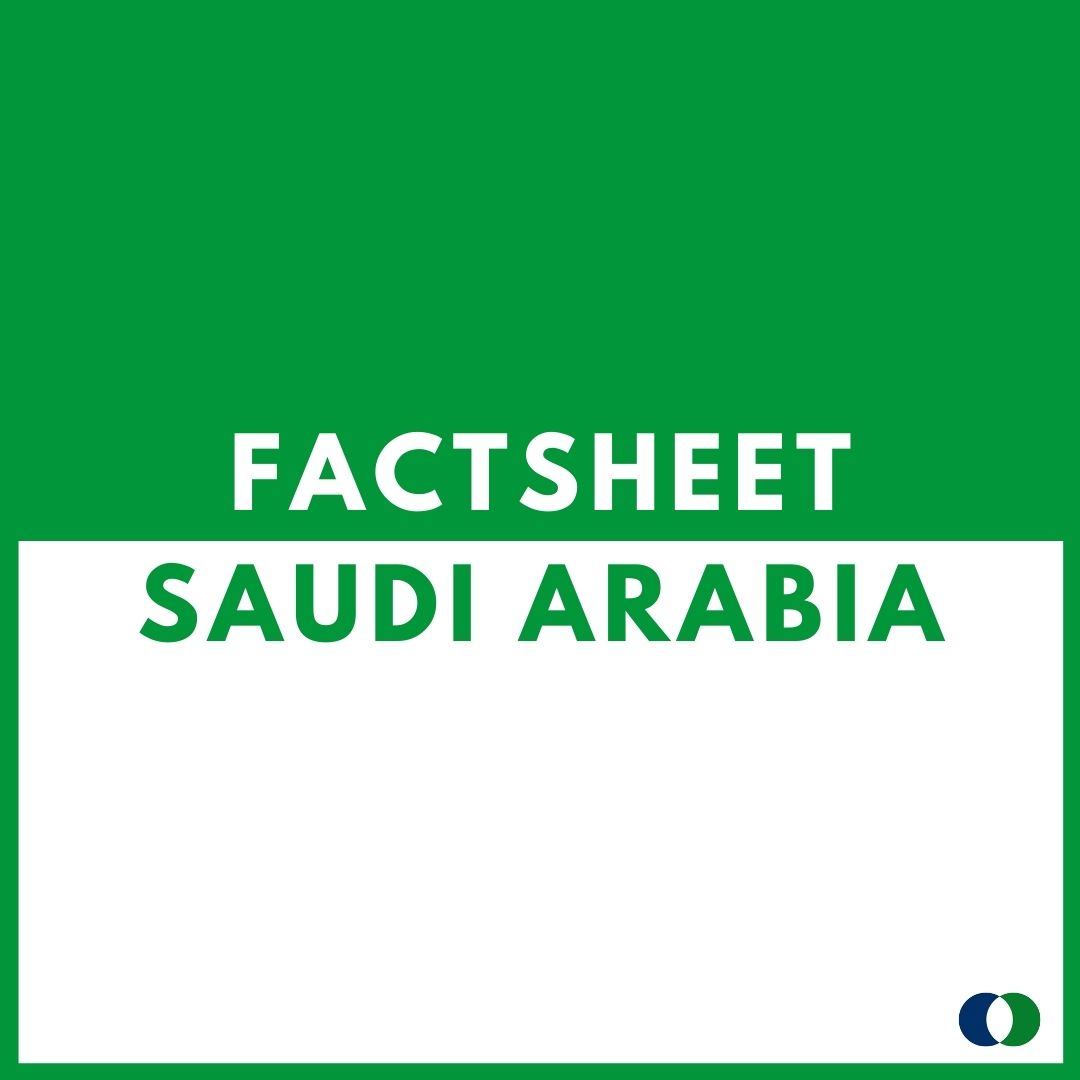Last updated: August 07, 2024
The Kingdom of Saudi Arabia is the largest country on the Arabian Peninsula. It borders Jordan, Iraq, and Kuwait to the north, Qatar and the UAE to the east, as well as Yemen and Oman to the south. In addition, it borders the Arabian Gulf to the east and the Red Sea to the west. There is also a man-made land border with Bahrain via the King Fahd Causeway. The capital Riyadh is located in the center of the country. The economic and commercial center of Jeddah lies on the Red Sea coast, not far from the holy city of Mecca. Saudi Arabia has about 36.5 million inhabitants, roughly ten million of them foreigners. The country is approximately six times the size of Germany.
Since 2015, HM King Salman bin Abdulaziz has been in charge of the affairs of state and government. He is presumably the last son of King Abdulaziz Ibn Saud, who united the kingdom in 1932, to rule Saudi Arabia. Since June 2017, the line of succession has included HH Prince Mohammed bin Salman, a grandson of the state’s founder, who is currently deputy prime minister and effectively runs the country.
Saudi Arabia is going through a period of political and economic reform that, if successful, will fundamentally change the country. Crown Prince Mohammed bin Salman is the driving force behind both the military intervention in Yemen in his capacity as Defence Minister and Vision 2030 in his capacity as Chairman of the Council for Economic and Development Affairs.
The transformation has led to liberalisation in many areas of life despite ongoing controversies. For example, Saudi Arabia faces international criticism for recent events surrounding the curtailment of free speech and the repression of journalists. On the other hand, since June 2018 women have been legally allowed to drive cars and the proportion of women participating in the labour market has also risen from 20 percent to 33 percent within two years. In addition, the entertainment and tourism sectors have gained momentum.
Saudi Arabia imports 144 billion US dollars worth of goods, mostly food, chemical products, and cars. Germany is its fourth biggest import partner after China, the US, and the UAE. Germany in turn imports petroleum, chemical products, and raw materials from Saudi Arabia.
As the world’s leading oil exporter, controlling 17% of global resources, Saudi Arabia is striving to become less dependent on oil. Much of the government’s revenue is generated by the oil sector. This is why “Vision 2030” envisages a fundamental restructuring of the Saudi economy: the transition from a rent-based to a knowledge-based economy. Within the framework of Vision 2030, megaprojects are to be implemented that will significantly influence life in the future through new, sustainable and efficient concepts. The focus is on investments in energy, mining, infrastructure and education. In 2019, 1.5% of shares in state-owned oil company Saudi Aramco are being sold for US$25 billion. This is part of an investment strategy with a total volume of four trillion US dollars spread over several megaprojects such as Neom, the new city planned in the northwest of the kingdom.
The extent to which the planned projects can be completed on time is questionable. However, even a partial success would significantly change the Saudi economy. The numerous investment projects create a broad spectrum of trade and investment opportunities for companies with distinctive know-how in the respective industries. In early 2021, 20 special economic zones were announced for this purpose adding to the attraction of long-term foreign investments.
- Ministry of Commerce
- Ministry of Culture
- Ministry of Communication and Information Technologies
- Ministry of Environment, Water and Agriculture
- Ministry of Economy & Planning
- Ministry of Education
- Ministry of Energy (AR)
- Ministry of Finance
- Ministry of Foreign Affairs
- Ministry of Health
- Ministry of Human Ressouces and Social Development
- Ministry of Interior
- Ministry of Justice
- Ministry of Municipal & Rural Affairs (AR)
- Ministry of Transport
- Ministry of Tourism
- Al-Hasa Chamber of Commerce and Industry
- Asharqia Chamber
- Council of Saudi Chambers
- Delegation of the German economy in Saudi Arabia
- Jazan Chamber of Commerce
- Jeddah Chamber of Commerce
- Makka Chamber of Commerce and Industry (AR)
- Najran Chamber of Commerce and Industry (AR)
- Qassim Chamber of Commerce and Industry (AR)
- Riyadh Chamber of Commerce (AR)
- Tabuk Chamber of Commerce and Industry (AR)
- Al Eqtisadiah (AR)
- Al Jazirah (AR)
- Al Riyadh (AR)
- Al Watan (AR)
- Al Yaum (AR)
- Arab News
- Asharq Alwasat (EN)
- Saudi Gazette
- Saudi Press Agency
- Khaleej Times
Current tenders

